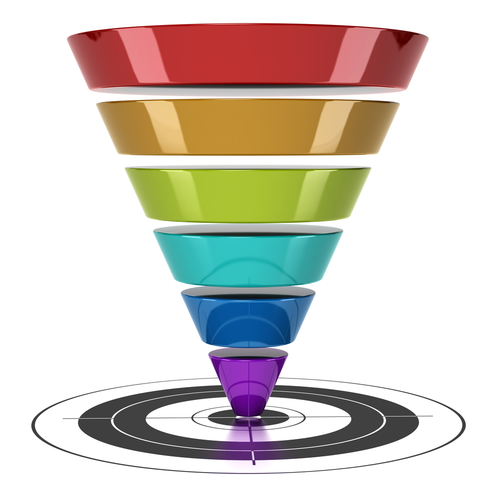
A funnel is typically used when pouring one item from one container to another container, gathering the substance at the wide top and condensing it into a narrower stream so that it easily flows into the secondary container without spilling over.
At Genius Monkey, we use the funnel as a metaphor to describe the sales process from the very first contact of a potential customer, to the final purchase of the service or product being offered. The funnel, however, is a leaky one, in which items (sales opportunities) can drop out before reaching the end. This happens when the potential consumer loses interest in the commodity, or if Genius Monkey determines that the customer doesn’t fit the targeted demographic. In any case, the number of potential buyers going into the funnel is different than the number of consumers that reach the final exit point.
The stages of a sales funnel represent the degree of readiness of a potential customer to actually commit to a purchase. This increases the possibility of a sale, as well as future sales through recommendation, as the process narrows the field. The metaphor of the funnel helps Genius Monkey to analyze and manage the wide portfolio of opportunities for sales. The further down the funnel the prospective buyer moves, the more likely he or she is to make the purchase and spread the word.
The different stages of the sales funnel are:
Awareness Genius Monkey reaches out to the targeted demographics, placing the name of the business in front of the shopper on various screens, letting potential buyers know that they exist, and that they have the product that the shopper is looking for. We are able to learn the desires, behaviors and tenancies of potential customers as we gather data from data based platforms, real-time bidding, audience targeting and ad optimization. Programming highly effective ads is the basis of who we are, and what we do.
Consideration The shopper must determine if they really do want, or need, the service or product offered by the marketer. By the repetitious, or timely, viewing of the brand, the shopper is faced with a viable possibility. They may visit the websites of the marketers competitors to determine which company they want to make the purchase from.
Evaluation Shoppers do not always purchase the brand they intended on buying. With the adequate provision of knowledge and education, they will begin to evaluate and analyze their needs. This is the point where the potential buyer must decide if the need really exists, and if he or she can afford the price, as well as which brand would really fit their requirements.
Purchase If the prospective customer has made it through all of the above stages, the likelihood of a purchase is greatly increased.
Advocacy If the customer is completely satisfied with the purchase they make, they will usually be sure to spread the good news through word of mouth, positive reviews, etc.
At Genius Monkey, we layer offline demographics and actions with online activity to provide the highest level of targeting. During the funneling process, we strive to remove any barriers that may prevent the prospect from progressing through the funnel. As each barrier is removed, the prospective buyer advances to the next stage of the funnel, bringing him or her that much closer to making the purchase. Some of these barriers may include things like; an uncertainty as to whether or not the product will be a good fit for their needs, a lack of funds to make the purchase or a difference in the buying process of the customer.
Genius Monkey manages the sales funnel using the appropriate sales metrics for the individual businesses that we represent. This includes specific steps and actions to help advance potential customers, in a seamless fashion, from stage to stage, increasing the possibility of a sale as they make their way towards the bottom of the funnel.
By quantifying the number of potential customers at each stage of the funnel, Genius Monkey can make surprisingly accurate predictions as to the number of prospects that will eventually become purchasers. Over time, we can spot changes in the numbers along the pipeline that may indicate problems, and take corrective measures to optimize the performance of the ad campaigns of our clients.



